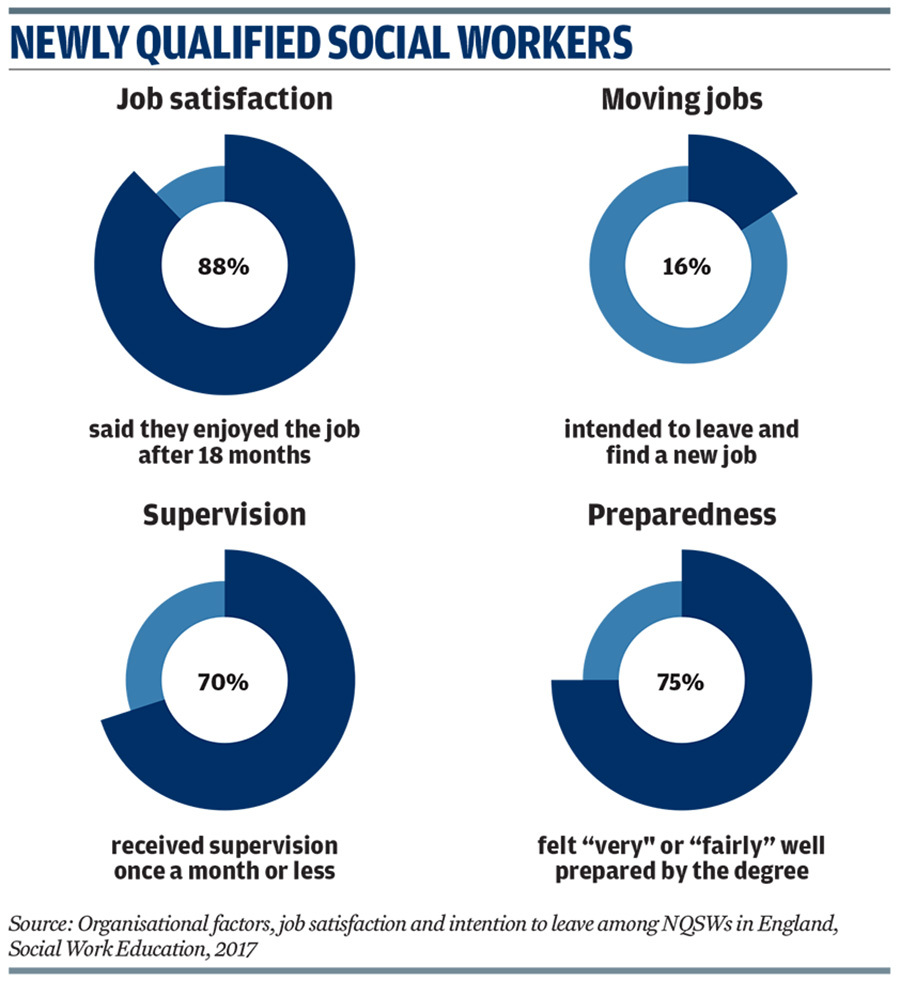Organisational Factors, Job Satisfaction and Intention to Leave Among Newly Qualified Social Workers in England
Research in Practice
Tuesday, April 24, 2018
This article reports on a longitudinal study of 280 social work students, focusing on their experiences as newly qualified social workers (NQSWs). It reports on the relative importance of their satisfaction with different work elements (e.g. supervision and job engagement) and uses the findings to construct a model of NQSWs' overall satisfaction and their intention to remain in or leave their job.

- Authors Shereen Hussein, Jo Moriarty, Martin Stevens, Endellion Sharpe & Jill Manthorpe
- Social Work Education (2017)
Background
The need to improve social work, in particular the performance of NQSWs, was identified by the Social Work Task Force (2009) and the Social Work Reform Board (2010). Most of the identified issues were attributed to variations in the quality of social work education.
However, according to research by Moriarty et al. in 2010, experiences in the workplace can also enable or hamper the quality of NQSWs' practice. Providing additional support to NQSWs during their first year in practice can increase their confidence and satisfaction with their job. As a consequence, they are more likely to stay in their jobs than those who do not receive additional support.
Although there are significant relationships between job satisfaction and intention to leave, both these elements are influenced by a range of other factors (e.g. pay and work environment) and by personal characteristics, such as response to stress and rewards.
Study methods
The study used a panel survey to follow up 280 social work students as they graduated (between 2008 and 2010) and then again at around 18 months working as a social worker.
The study aimed to understand the relationships between the following characteristics and NQSWs' job satisfaction and intention to leave their job:
- How well prepared they feel
- Their personal characteristics
- Organisational structures.
Statistical analyses were used to investigate these relationships and build a theoretical model to identify the "best" set of factors to predict NQSWs' job satisfaction and their reported intention to leave their jobs.

Study findings
- Job satisfaction: The majority of NQSWs were enjoying their job at the 18 months point (40 per cent quite enjoying, 47.8 per cent enjoying very much).
- Intention to leave: Overall, 16.2 per cent reported that they were looking for another job.
- Workloads: NQSWs working in local authority children's departments reported having less manageable workloads than those working in the private/voluntary sector.
- Supervision: 29 per cent reported that they had supervision at least every fortnight, while 70 per cent received monthly or less. The perceived quality of supervision had a strong relationship with job-related factors (e.g. ability to translate their values into practice; having a manageable workload; their working conditions).
- Readiness to practice: Around three-quarters of NQSWs felt "very" or "fairly" well-prepared by their degree programme for their current job. Those who felt more prepared for the role were more positive about their job.
Implications for practice
- Factors that are strongly associated with NQSWs being less likely to leave their jobs included:
- Being well-prepared for their role by their degree programme
- Being able to express their values in practice
- Being highly engaged in their job
- Having a supportive team.
- Creating workplaces where employees feel involved, which reflect their values, and where there is a supportive team can improve staff effectiveness and increase retention
- This study was based upon responses from social workers who completed their degree between 2008 and 2010. Since then, the Assessed and Supported Year in Employment (ASYE) and other programmes have been introduced. The Step Up to Social Work programme is currently being evaluated.
The research section for this special report is based on a selection of academic studies which have been explored and summarised by Research in Practice, part of the Dartington Hall Trust.




